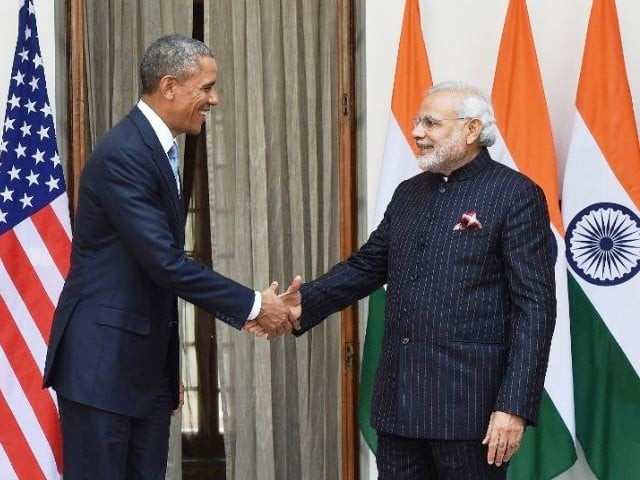Obama is finally in India for his second official visit since he commenced his second term in the office. The visit is important for various reasons.
First and foremost, due to its powerful symbolism: Obama is the first US president visiting India, twice.
Secondly, an American president’s presence at the Republic Day of the world’s largest democracy also sends a very powerful message.
But there are some serious questions occupying the minds of those in India and Pakistan. Will the visit prove to be just a theatrical trip of smiles and handshakes or can India really get something out of the guest who is left with just two years in a White House fraught with domestic economic crisis and, above all, a hostile Republican majority in the Congress? Of course, it is yet to be seen whether these energetic photo-ops are just ‘love-making elephants’, more sound but no certainty for substance or consequences.
However, with the dawn of Modi’s ascendancy to power, India’s relationship with the United States appear to be undergoing a dramatic shift with indications of American willingness to deliver on the Indo-US nuclear deal and the Modi government pushing for FDI in defence.
Given that the uncertain triangle of Pakistan-US-India to some extent has historically been constructed around the lines that the dilution of US relations with one country provides an impetus to the US improving relations with the other country. After all, it is not just coincidental that General Raheel Sharif tends to be in China at the same time Obama is in India. This current paradigm shift therefore gives rise to an important question:
What impact will the on-going Indo-US cooperation have on the Pak-US relations?
The answer, I believe, is none.
For the reason, that the modalities of Pakistan’s relationship with India are completely different than that of our relations with US. After all, we don’t have any border dispute with the United States and our soldiers don’t get killed by US troops at the Line of Control (LoC).
Though India has been instrumental in determining the dynamics of Pak-US relations, the rationale for US relations with Pakistan and India, one a long-time strategic partner and the other a booming economic powerhouse, are extremely different. Today, the US looks at India through the prism of its ‘pivot to Asia’s policy, to counter the Chinese hegemony in the region. While Pakistan and the United States, for the last three decades, continue to stick together through a single imperative – Afghanistan.
Secondly, India’s expectations from the US are also different. India today has a global agenda; all the expected talks between Modi and Obama are on economy, technology, environment and seeking support for India’s entry into global powers with a permanent seat in the United Nations. While the Pak-US bilateral relationship is confronted with questions regarding drone strikes, terrorist safe havens in the tribal areas of Pakistan, Pakistan’s support to the Afghan Taliban and its lack of will to contend Pakistani Taliban and organisations such as Lashkar-e-Taiba (LeT), Pakistan’s links with the Haqqani network, anti-India militant outfits in Pakistan, Pakistan’s relations with Iran, nuclear weapons etcetera.
In fact, the shared view of India and the US towards Pakistan is that both consider Pakistan a source of terrorism. Obama, knowing the importance of cooperation with Pakistan for stability in Afghanistan, may not come as strident on Pakistan as the Modi government aspires but, unlike his predecessor President Bush, Obama may not conveniently ignore it either.
Similarly, on India’s membership in the Security Council, neither will the United States concede it so easily nor does Pakistan appear to be perturbed by it. Because Pakistan perceives China as its best, if not its last, bet in terms of diplomatic support in favour of Pakistan’s interests. This expectation has its roots in history. Whether it be the facilitation of the United States Secretary of State Henry Kissinger’s visit to China through diplomatic support from Pakistan in 1971, or the question of China’s right over Tibet and Taiwan, Pakistan has always advocated full diplomatic support in favour of China.
The US foreign policy is shaped by its global perspectives. In case of India and Pakistan, both the countries have criticised the US when one feels the United States is tilting towards the other. But generally, cordiality marks the United States’ approach towards both, India and Pakistan, because of the differing interests the US has in both cases.
Pakistan, however, still needs to realise that its narrowed geographical focus on containing India has affected its image on the global stage. The fact that Obama is in India for the second time, each time flying over Pakistan without a stop, reflects the utter failure of our diplomacy.
Relax Pakistan! Obama’s trip to India will not jeopardise Pak-US relations
The fact that Obama is in India for the second time, however, does reflect the utter failure of our diplomacy.



COMMENTS
Comments are moderated and generally will be posted if they are on-topic and not abusive.
For more information, please see our Comments FAQ